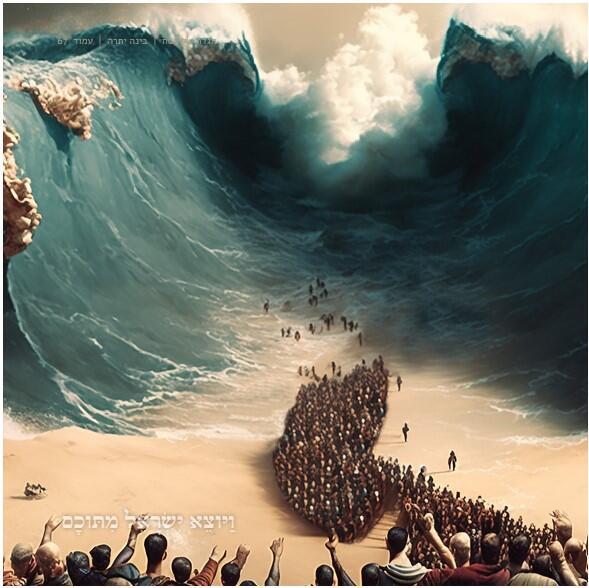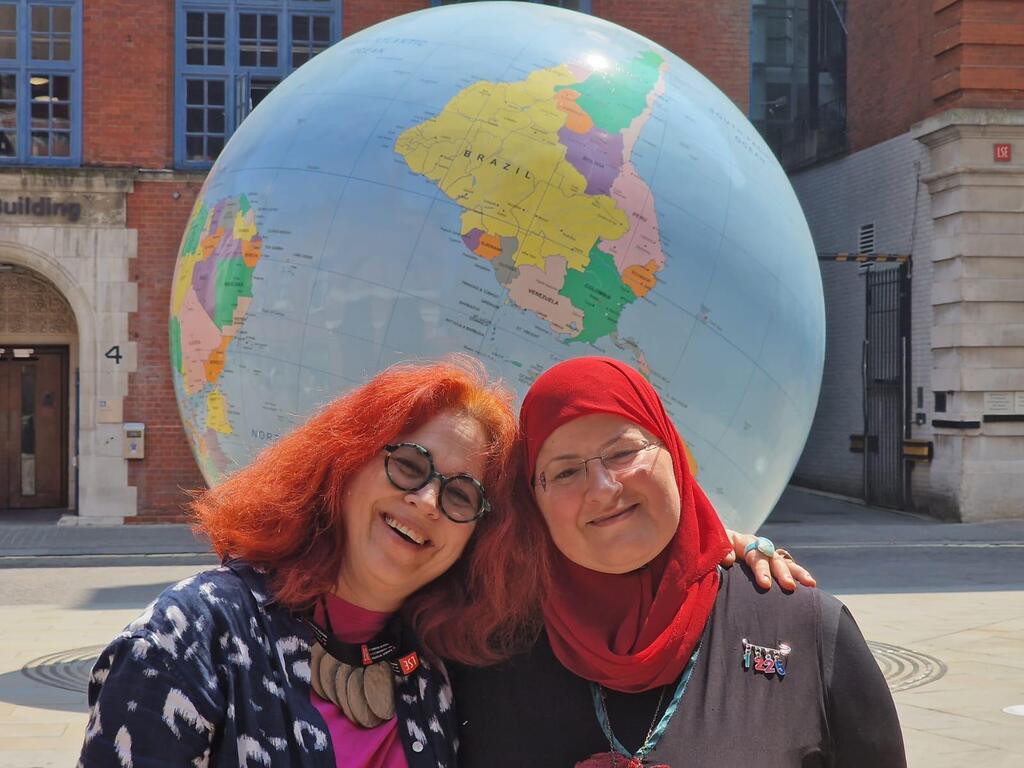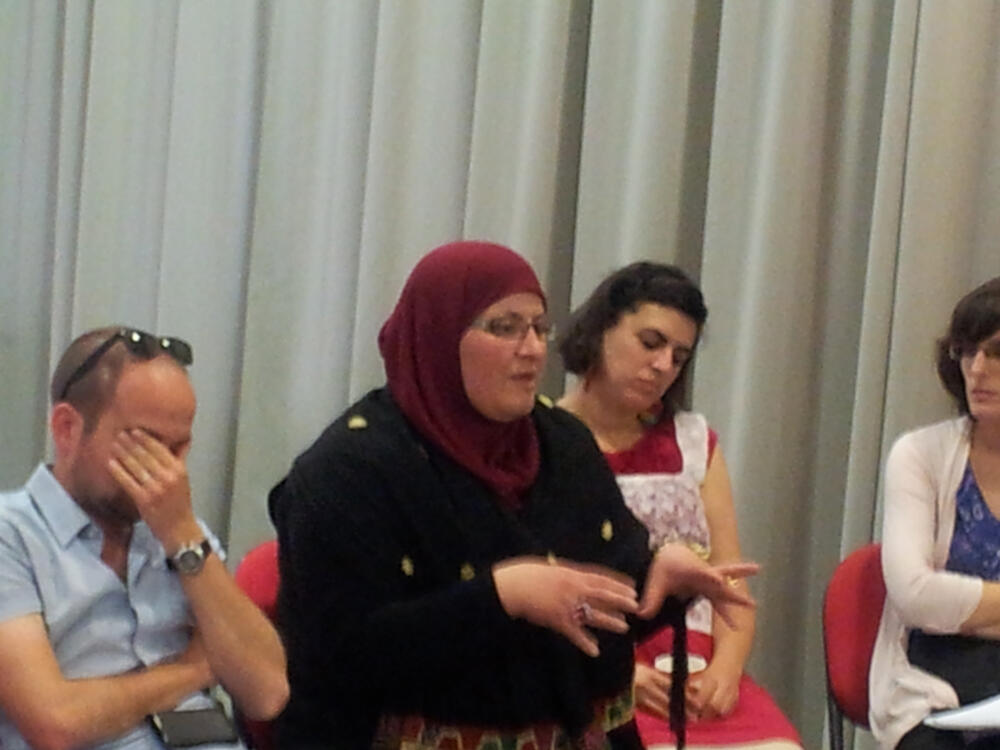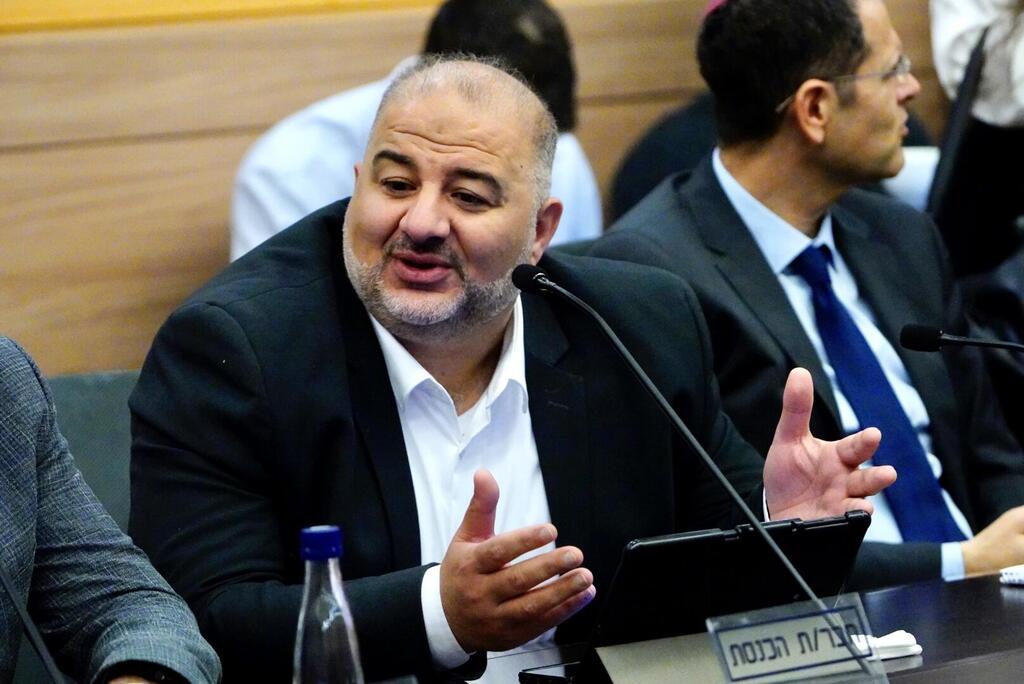It is impossible to remain silent in the face of the scandalous number of murders in the Arab sector, and it is also time to ask whether the struggle for Israeli democracy gives this population a place or alienates it.
Read more:
I met for a chavruta (learning partnership) with social activist Ghadir Hani, a Muslim Arab from Acre, and I left with important insights and a message of compassion.
6 View gallery
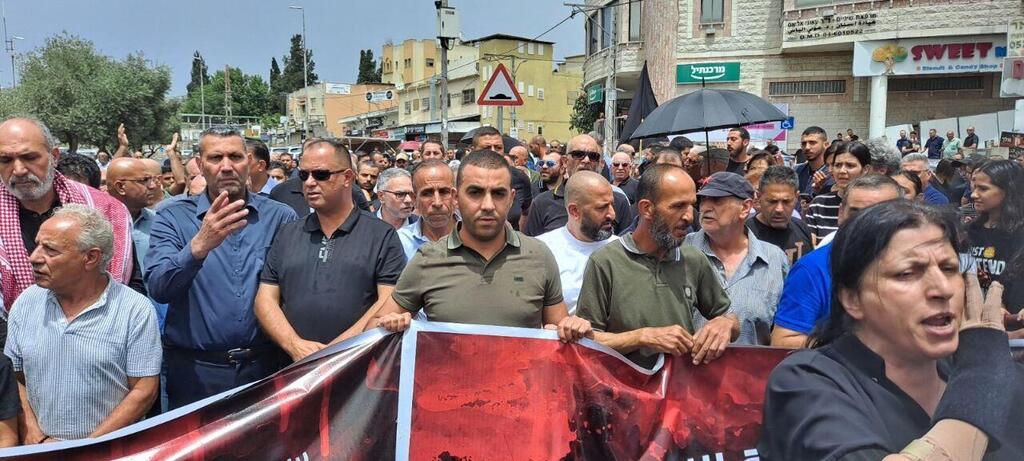

Residents of the Arab town of Yafa protest violent crime surge after five locals massacred in broad daylight
The camp that does not hate
We are sitting on the top floor of a building at the London School of Economics and Politics (LSE), eating salad and looking out of the windows at the students walking with cups of coffee through the paths of the university.
I ask Ghadir: "Tell me, do you sometimes feel like the earth would swallow someone, someone particularly bad?"
"No," she replies in an almost casual tone. "I don't hate anyone, I don't associate with the emotion of hatred and I don't wish death or suffering on people who make me sad."
"I think I would also skip this option, but the Torah doesn't," I say, and we both laugh.
This strange conversation took place between Ghadir Hani and me during a lunch break in the middle of a conference on "Women of Peace and Faith".
Ghadir is a Muslim Arab who was born and raised in Acre, lived for twenty years in Be'er Sheva and Bedouin settlements in the Negev; she has now returned to Acre.
Ghadir is a social and peace activist, and her hands are full; she works at the Acre Mediation Center as a coordinator of mixed city programs, is active in peace organizations (among others "Women Wage Peace") and in groups for interfaith dialogue, and she manages the Facebook page "Habima - Al Manbar" which is dedicated to interfaith dialogue.
Learning partner with Ghadir Hani
I asked Ghadir to be my companion for studying the weekly parsha (portion) and she accepted the challenge with the enthusiasm that characterizes her and her pursuit of building relationships of peace and truth between religions.
Last Shabbat, we read the portion of Korah in synagogue, and I summarized for Ghadir the gist of the strange story about Korah and his assembly: "Moshe was the official leader of the Israelites in the desert. His brother, Aaron, assumed the position of high priest (a position that also involves receiving various types of gifts). Their sister, Miriam, was probably also an important leader but her role was silenced by the biblical narrator.
In any event, not everyone liked the fact that all the leadership power was concentrated in the hands of one family, and stories of rebellion against Moses and Aharon also took place in last week’s parsha, 'Shelach Lech', which describes the story of the spies, as well as in our parsha.
"One man named Korah”, who is also from the Tribe of Levi, gathered around him a group that criticized the centralization of power in the hands of Moses and Aaron.
At the heart of their words was a claim that was understandable from a spiritual point of view and also beautifully worded: "The whole congregation are all holy, and God is in them, and why should you ‘carry’ God's people."
In response to the rebellion, Moses and Aaron mobilize God’s help and he performs a series of miracles, which culminate in: "And the earth will open its mouth and swallow them and their houses and all the people that are with Korah and all their possessions.”
"So Korah and his gang were the problematic ones in the story?" Ghadir clarifies. "Depends on who we ask," I replied. "From the point of view of the Torah and from the point of view of Moses and Aaron, Korah and his companions were very bad. But the Torah, like many of the documents of the past, was written by the victors. If Korah had defeated Moses and Aaron, we would have received a different story.
Nevertheless, I am on the side of Korah, on the side of the weak and underprivileged, on the side of those whose stories are threatened by the danger of being forgotten and swallowed up."
This was my conclusion and how I understood the division of power of last week’s parsha (portion).
"As a woman of faith," Ghadir replies, "I prefer to think that God always knows what he is doing, even if I don't like the idea of people being swallowed up into the ground.
Besides, lately, I feel that the ground is pulling us all into it. That we have reached the bottom. Maybe this is not the bottom, because it's always when we seem to reach the bottom, we find out there's still somewhere to fall, so maybe we've only reached the abyss."
To whom does Israeli democracy belong?
Effortlessly, we move from discussing the concentration of power in the hands of Moshe and Aaron, to the concentration of power in the hands of Prime Minister Benjamin Netanyahu and the proposed judicial overhaul in Israel.
Ghadir Hani is a prominent figure in the demonstrations against weakening the judicial system and sometimes she finds herself traveling to speak at several demonstrations in one evening.
"At first it was difficult for me to participate in these demonstrations given that the demonstrations are composed of Israeli flags, military personnel and privileged figures in Israeli society that made me feel left out of the picture. And in general, I don't want to keep the existing democracy because it doesn't work for me nor for other underprivileged groups," she tells me.
"In the end, I decided to participate in the demonstrations and speak at them as a Palestinian Arab: to demand that the subject of the occupation was given a voice at the demonstrations and that we, Palestinian men and Palestinian women, are not alienated from Israeli democracy.
"I stand on the stage during demonstrations and ask the audience: Is the democracy you are talking about only for Jews or does it include me as well? Will you stand by our side when [National Security Minister Itamar] Ben-Gvir sets up his militias?
"I also asked these questions at a demonstration in Haifa and suddenly I heard ten thousand women and men shouting 'yes' to me. Do you understand what that means to me? Today I am part of a group that is examining how the Arab sector can be integrated into demonstrations and are part of the struggle for the character of Israeli democracy."
Category of citizens: Dead
It is impossible to remain silent in the face of the scandalous number of murders in the Arab sector. While we are eating a salad on the roof of a building in London, we go online and check the number of people murdered throughout Arab communities in Israel in 2023 – it stood at 102. This number keeps going up almost every day and the authorities are doing nothing.
6 View gallery
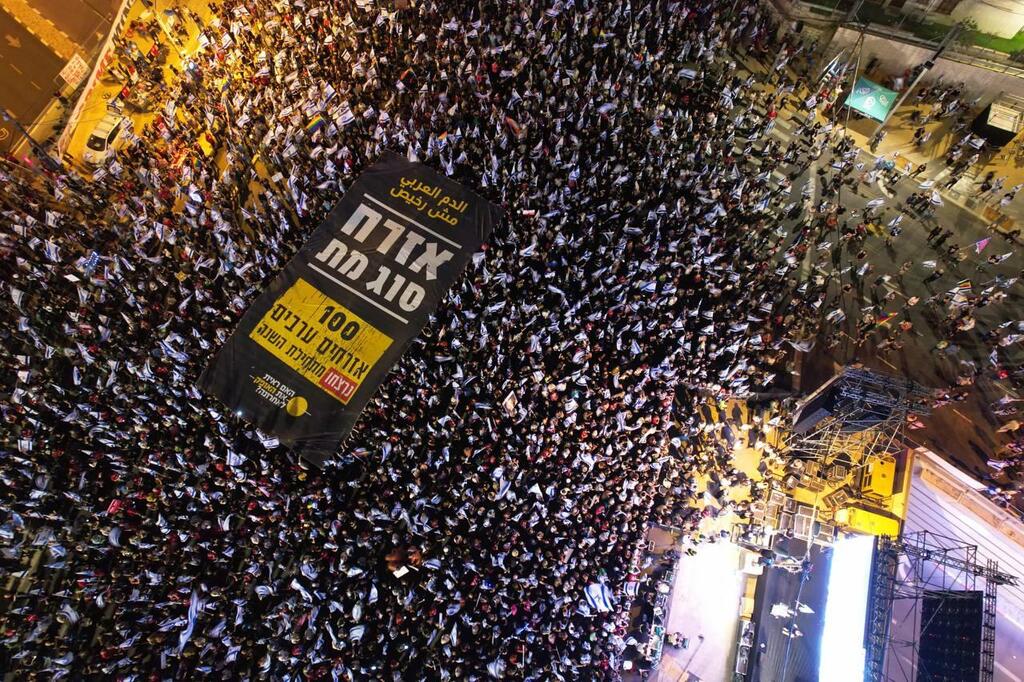

Anti-judicial reform demonstrators holding sign in protest of mounting crime death toll in Arab sector, in Tel Aviv
(Photo: Elad First)
Ghadir does not try to hide her anger: "We have never been a violent society. Our religion is not violent either. These are crimes committed by young men who cannot see any prospects for their future lives. The unemployment rate in Arab communities is high, the education system suffers from years of neglect, and Arab communities suffer an enormous housing crisis. There are young people who despair and turn to violence.”
"What is terrible is that it seems that the police are not trying to investigate and resolve the violence in the Arab sector," she notes, "if it had been murders within the Jewish sector, or especially Arabs murdering Jews, the issue would be a priority, it would receive (government) funding, and it would have been resolved quickly.
"Currently, the authorities have clear tasks: they need to solve far more murder cases, they need to confiscate illegal weapons and they need to prosecute the Jewish and Arab arms dealers and the murderers. (Instead), for many years, the authorities have been destroying the lives of Arab citizens."
Ghadir sadly adds: "The Arab community is already indifferent to its own suffering. After the murder of five people in Yafa, a demonstration was organized and only a thousand people came. This is an expression of indifference.
"The Arab sector has no confidence in its own leadership. So many years of protest and struggle and we still live with discrimination. So, everyone focuses on their private home and hopes that their home will not be damaged by the violence.
"Today there is a lively conversation about the establishment of a civil guard, without weapons, in Arab communities. Organizations have already started in this area, but even here, the organizers have paid with their lives, so this is not a solution. The police must take responsibility and obviously cannot distribute weapons to civilians, Jews or Arabs – this will only deepen the problem."
Ghadir tells me that she was a partner in the effective organization "Mothers on Guard" – mothers from the Jewish-Ethiopian community who stood and demonstrated in front of the police. It was an organization of mothers who kept their children from being discriminated against by the authorities.
"The Arab Higher Monitoring Committee consists almost exclusively of men, but the female voice has tremendous power. We are mothers, spouses, grandmothers and sisters, and we must find a way to stop the violence," she says.
"Today, more than ever, Arab women are afraid to compete for a place on the lists for the local authorities. Criminal organizations have taken over the Arab local authorities and the fight against them is an immediate danger to the lives of the women candidates and their families."
Participation or continued resistance
It seems to me that this is the burning question of Israel's Arab sector – whether to continue giving priority to the shared struggle with the Arabs of the territories, or to fight for the full integration and rights of the Arab communities within Israeli society.
"Mansour Abbas took a brave step when he joined the government," Ghadir says. "I think the Arab parties should join or at least support a proper government that will lead to a change in the relationship with the Arab sector and within the Arab sector itself. Many people went to the polls to vote for Abbas feeling that change was possible and imminent, but in the end, we got a ‘horror’ government and it was a terrible disappointment."
So no one will suffer
Ghadir is firm in her opinion that she has no desire to use the earth's miraculous ability to open its mouth. I don't hold back and I challenge her further.
"Let's say one of the radical members of the government arrived here now, on the sixth floor of our building, poured himself a cup of coffee and came to sit next to us at the table, how would you react?"
"I’d get up and leave," says Ghadir, "there is a limit to what I can bear. I don't want anyone to suffer. I have no desire for the earth to swallow him up, but neither can I sit next to him."
I don't let up. "And what would you say to him when you get up from the table?"
Ghadir ponders and chooses her words carefully: "Remember that there is a God and before Him you will give an account for all the things you said and the actions you did.
I say this as a woman of faith, to a man who claims to be of faith."
I love Ghadir and my heart is full of gratitude for the Torah I learned from her.
- Translated by Dr. Lindsay Simmonds


